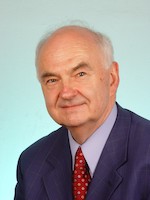Prof Janusz Kacprzyk
Polish Academy of Sciences, PolandLinguistic data summarization: a step towards human comprehensibility of static and dynamic data
Abstract:
Our main concern is an attempt to make the "computer", in the sense of all kinds of tools and techniques that are inherently based on the use of computers, to be human consistent, in the sense of being based on, or using human specific faculties. More specifically, we take as a point of departure the fact that for the human being the only fully natural means of communication and articulation is natural language which is "strange" to the computer. Therefore, it might be a good solution to use natural language in the formulation of problems, and presentation of results obtained as this would make them more comprehensible to the human user. Traditionally, visualization is used with much success. Much less popular is verbalization in which the results are presented in (qusi)natural language though in many applications, e.g. in transportation or military, voice messages, commands, etc., are preferable as they do not distract attention.
We present a conceptually simple, yet powerful concept of a linguistic data(base) summary which constitutes a short sentence(s) in natural language that summarizes the contents (semantics) of even very large data sets. For instance, in a personel database, a linguistic summary may be "most young employees have low salaries". We use Yager's (1982) and Kacprzyk and Yager's (2001) approach that employs fuzzy logic with linguistic quantifiers. We present linguistic summarization of both static and dynamic (time series) data, and present main protoforms of such linguistic summaries. As an example of a real application we present the use of linguistic summaries for supporting decision making at a computer retailer that makes use of data from local and remote (Internet) sources of data, and yileds linguistic summaries comprehensible to a human user.
We conclude with some remarks on the role of linguistic data summaries in the broadly perceived explainable artificial intelligence (XAI), and the users' truist in results obtained.
Biography:
Janusz Kacprzyk is Professor of Computer Science at the Systems Research Institute, Polish Academy of Sciences, WIT - Warsaw School of Information Technology, and Chongqing Three Gorges University, Wanzhou, Chinqgqung, China, and Professor of Automatic Control at PIAP - Industrial Institute of Automation and Measurements. He is Honorary Foreign Professor at the Department of Mathematics, Yli Normal University, Xinjiang, China. He is Full Member of the Polish Academy of Sciences, Member of Academia Europaea, European Academy of Sciences and Arts, European Academy of Sciences, Foreign Member of the: Bulgarian Academy of Sciences, Spanish Royal Academy of Economic and Financial Sciences (RACEF), Finnish Society of Sciences and Letters, and Flemish Royal Academy of Belgium of Sciences and the Arts (KVAB). He was awarded with 5 honorary doctorates. He is Fellow of IEEE, IET, IFSA, EurAI, IFIP and SMIA.
His main research interests include the use of modern computation computational and artificial intelligence tools, notably fuzzy logic, in systems science, decision making, optimization, control, data analysis and data mining, with applications in mobile robotics, systems modeling, ICT etc.
He authored 7 books, (co)edited more than 150 volumes, (co)authored more than 650 papers, including ca. 100 in journals indexed by the WoS. His bibliographic data are: Google Scholar: citations: 29898; h-index: 76, Scopus: citations: citations: 8977; h-index: 41, Publons: citations: 9612, h-index=43, Web of Science: citations: 7168; h-index: 36. He is listed in 2020 "World's 2% Top Scientists" by Stanford University, Elsevier (Scopus) and ScieTech Strategies and published in PLOS Biology Journal.
He is the editor in chief of 7 book series at Springer, and of 2 journals, and is on the editorial boards of ca. 40 journals.. He is President of the Polish Operational and Systems Research Society and Past President of International Fuzzy Systems Association.
Back to Keynote Speakers


